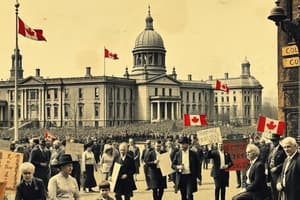Podcast
Questions and Answers
Who is credited with founding modern-day Quebec?
Who is credited with founding modern-day Quebec?
- Samuel De Champlain (correct)
- Voyageurs
- Jacques Cartier
- Coureur de bois
The Treaty of Utrecht resulted in France gaining territory from Britain.
The Treaty of Utrecht resulted in France gaining territory from Britain.
False (B)
What was the primary commodity that drove the economic activities of the coureurs de bois?
What was the primary commodity that drove the economic activities of the coureurs de bois?
Fur
The forced removal of Acadians by the British is known as the Great ______.
The forced removal of Acadians by the British is known as the Great ______.
Match the individuals or groups with their primary role in the context of New France and British North America:
Match the individuals or groups with their primary role in the context of New France and British North America:
Which of the following best describes the role of voyageurs?
Which of the following best describes the role of voyageurs?
The Wabanaki Confederacy primarily allied with the British due to their respect for indigenous land rights.
The Wabanaki Confederacy primarily allied with the British due to their respect for indigenous land rights.
What was a significant long-term consequence of the fur trade in North America?
What was a significant long-term consequence of the fur trade in North America?
Beyond economic factors, provide one significant reason why the habitants chose to migrate from Europe to New France.
Beyond economic factors, provide one significant reason why the habitants chose to migrate from Europe to New France.
The Treaty of Portsmouth, intended to establish peace between the British and the Wabanaki Confederacy, was undermined because the British failed to respect the First Nations' ______ rights.
The Treaty of Portsmouth, intended to establish peace between the British and the Wabanaki Confederacy, was undermined because the British failed to respect the First Nations' ______ rights.
How did the coureurs de bois contribute to the relationship between the French and First Nations people?
How did the coureurs de bois contribute to the relationship between the French and First Nations people?
The BNA (British North America) Act initially united all five British North American colonies.
The BNA (British North America) Act initially united all five British North American colonies.
Describe the key difference in role between voyageurs and coureurs de bois in the context of the fur trade.
Describe the key difference in role between voyageurs and coureurs de bois in the context of the fur trade.
Despite being signed as a gesture of peace, the Treaty of Portsmouth ultimately deteriorated due to British violations, including building on ______ territory and enslaving its people.
Despite being signed as a gesture of peace, the Treaty of Portsmouth ultimately deteriorated due to British violations, including building on ______ territory and enslaving its people.
Analyze the strategic significance of the Wabanaki Confederacy's alliance with the French, considering the geopolitical dynamics of the time.
Analyze the strategic significance of the Wabanaki Confederacy's alliance with the French, considering the geopolitical dynamics of the time.
Flashcards
Samuel De Champlain
Samuel De Champlain
French explorer who founded New France and Quebec in the early 1600s, establishing ties with First Nations.
Treaty of Utrecht
Treaty of Utrecht
A treaty in 1713 where France ceded territories like Acadia and Newfoundland to Britain and Spain.
Jacques Cartier
Jacques Cartier
French explorer in the late 1500s considered by many to be the founder of Canada.
Seigneur
Seigneur
Signup and view all the flashcards
Coureur de bois
Coureur de bois
Signup and view all the flashcards
Voyagers
Voyagers
Signup and view all the flashcards
Habitant
Habitant
Signup and view all the flashcards
The fur trade
The fur trade
Signup and view all the flashcards
New France
New France
Signup and view all the flashcards
BNA
BNA
Signup and view all the flashcards
Acadia
Acadia
Signup and view all the flashcards
Wabanaki Confederacy
Wabanaki Confederacy
Signup and view all the flashcards
Treaty of Portsmouth
Treaty of Portsmouth
Signup and view all the flashcards
Study Notes
- This is a review of Canadian History.
Key Terms
Samuel De Champlain
- Arrived in Canada in the early 1600s.
- One of the first French explorers in the New World.
- He founded New France and Quebec City.
- Maintained positive relationships with First Nations.
- Served as the chief administrator of the New France colony.
Treaty of Utrecht
- Created due to war breaking out between France and Britain after France tried to seize land when Spain had no king.
- France lost territory to Britain and Spain because of it.
- France ceded Acadia and Newfoundland.
- Established new border outlines.
- First Nations were not included in the outlining of territory.
Jacques Cartier
- A French explorer who arrived in the late 1500s.
- Still considered by many to be the founder of Canada.
Seigneur
- Rented farmland to farmers for a small fee.
Coureur de Bois
- French fur traders.
- They exchanged items like wire, cloth, reading glasses, and guns for fur.
- They sold fur to Europeans, who used it for hats and clothing.
- They learned survival skills and languages from First Nations.
- The French became more favorable against the British as a result of their friendship.
Voyageurs
- British canoeists.
- They transported fur for small fur trade businesses in the early 1700s.
- Unlike Coureur de Bois, they only transported fur (not trade or sell).
Habitant
- French landowners in New France who farmed and established their society and dialect.
- Most lived along the river.
- Farmed a small plot, often insufficient to support their families.
The Fur Trade
- Essential for European survival in the cold Canadian winter.
- Fur became a popular fashion item in Europe.
- Europeans traded goods for fur, leading to settlement in Canada to expand the trade.
- The desires of Europeans for fur was not understood by the First Nations people.
- The fur trade brought the coureurs de bois and the voyageurs to Canada
New France
- A French colony in North America from 1534 to 1763.
- The main focus was the fur trade.
BNA
- British Colonies in North America.
- Included Quebec, Nova Scotia, St. John's Island, Newfoundland, and Hudson's Bay.
- The BNA Act united 3 of the 5 colonies.
Acadia
- A French colony in the Maritimes (Nova Scotia, New Brunswick, and PEI).
- Acadians were farmers and fishers.
- The British expelled many Acadians over fears they would aid the French.
Wabanaki Confederacy
- A group of First Nations, including the Mi'kmaq and Maliseet, in Acadia.
- They united to protect their land and culture.
- Generally sided with the French due to British expansion.
- Supported the fur trade and fought in conflicts.
- When Britain broke their alliance, they fought back.
Treaty of Portsmouth
- Signed in 1713 between the British and some First Nations groups, including the Wabanaki.
- Britain agreed to stop using Wabanaki land, preventing construction.
- The Wabanaki Confederacy agreed to end attacks and return some land.
- It was intended to foster peace.
- The British did not honor their promise to respect First Nations land.
- The treaty was written in English, a language the First Nations did not understand.
- The Wabanaki Confederacy retaliated against British settlements and enslavement by attacking a newly built fishing station, sustaining attacks for many years.
Short Answer Review
- The Treaty of Portsmouth was meant to make peace between Britain and the First Nations. However, the British broke it by building on Wabanaki land and enslaving them. As a result, the First Nation groups, particularly the Wabanaki, chose to fight back by attacking British infrastructure in Acadia for ten years. Because the First Nations and the French were very close, the British assumed that the French were behind the attacks.
- A habitant was an independent landowner in North America who lived in New France with a simple life. Farming, chopping wood, and taking care of animals were their main tasks. They would have moved to North America from Europe for job opportunities and a chance to escape from poverty, hoping to spread their religion to the First Nations. Without their presence, New France may not have seen the value of building settlements, and Quebec's unique dialect might not exist today.
- The Treaty of Utrecht caused France to lose land, which was gained by Britain and Spain. France attacked Spain after their king died. The treaty made Acadia and parts of Newfoundland British territories which led to the greater influence of English-speaking people in the area. Without it, Canada might be a primarily French-speaking country, influencing immigration patterns and other aspects of its identity.
- Voyageurs were British canoeists transporting goods whereas Coureur de bois, were French traders exchanging metal goods for fur. Voyageurs were usually part of a business and could not trade, hunt, or sell fur. Coureur de bois fostered strong relationship with the First Nations learning their languages which built closer ties between First Nations and the French.
Studying That Suits You
Use AI to generate personalized quizzes and flashcards to suit your learning preferences.




